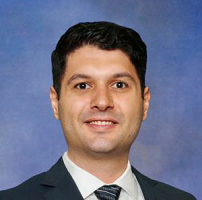
Farhad Khosravi
BioDirection, Inc., USA
Title: Development of silicon nanowire technology for biomarker testing
Biography
Biography: Farhad Khosravi
Abstract
Statement of the Problem: Traumatic brain injury (TBI) is a widespread problem afflicting all segments of the population. In most cases, concussion or mild traumatic brain injury is diagnosed based on a range of subjective, symptom-based tests that are frequently inconclusive. An objective point-of-care system able to diagnose TBI in minutes could have significant benefits, potentially leading to faster and more appropriate treatment. BioDirection, Inc. is a privately held medical device company is developing a novel rapid point-of-care technology for the objective diagnosis and management of traumatic brain injuries. The company’s lead product, the Tbit™ blood test, is being developed to deliver biologically based results to confirm a concussion accurately in minutes.
Methodology & Theoretical Orientation: Tbit™ platform test measurement is based on a well-established antigen-antibody interaction. The binding of antigen to antibodies located on the surface of the nanowire results in the change of electric field on the surface of the nanowire, which affects the conductivity of the nanowire and can be reliably measured using electronic means. Silicon nanowires offer significant advantages compared to more traditional approaches, allowing femtomolar sensitivity (in the range of 1000 of molecules), small sample volume (mcL range), fast measurement time (seconds) and tolerance to matrix effects.
The Tbit™ sensor was developed using semiconductor manufacturing processes. Single-crystal silicon nanowires were synthesized using metal nanoparticle-catalyzed chemical vapor deposition. Automated nanowire deposition onto the silicon wafer, followed by conventional photolithography, resulted in a multiplex, individually addressable immuno-FET sensor device. Antibodies can be attached to the surface through conventional silane chemistry.
Findings: Analytical characterization of the devices demonstrates that the response is proportional to the concentration of analyte and the response has a good correlation with predicted nanowire behavior.
Conclusion & Significance: We have shown a mass-producible, cost-effective, reliable and reproducible silicon nanowire field-effect transistor (FET) that can be used for biosensing and Tbit™ test. Most importantly we have been able to demonstrate the analyte detection directly in the blood. Application of this technology to mTBI diagnosis promises fast delivery of actionable information about a patient’s state.

